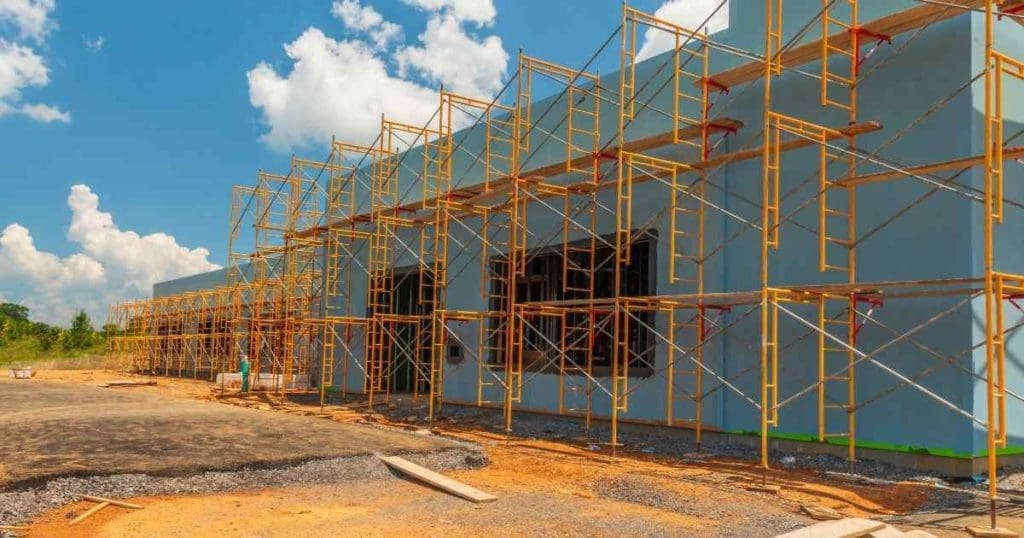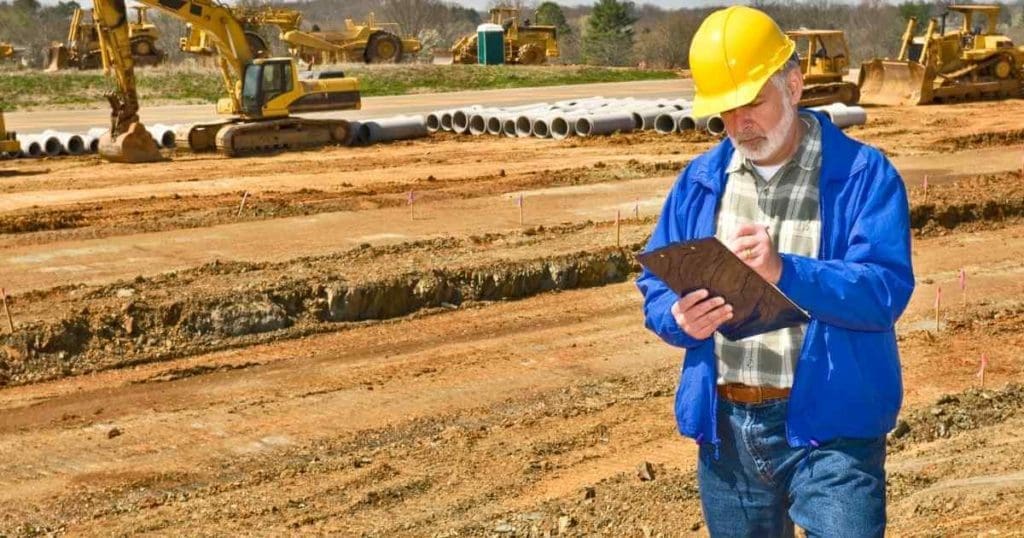A general contractor is responsible for the day-to-day management of a construction site, commercial, residential, or industrial, the management of vendors and trades, and the communication of information to all trades and vendors during a building project. Learning how to become a general contractor, obtaining a contractor’s license, and setting up the business is crucial if you’re considering this field of work.
How do you become a general contractor?
- Choose a specialty
- Receive relevant certificates and education
- Gain construction experience
- Get licensed
- Bid for jobs
At MatchBuilt, we primarily serve general contractors, i.e., residential homebuilders, that build large-scale master-planned new-home developments. Our clients oversee all aspects of land development, laying foundations, framing homes, and gaining a certificate of occupancy when homes are complete. Similarly, general contractors in commercial or industrial construction will develop the land and build anything from shopping centers to hospitals to skyscrapers.
There are numerous opportunities for those with the right skill-set, background, and education to succeed as a building contractor and oversee the entire construction process or a significant portion of it. If you’ve been considering how to become a certified general contractor or how long it takes to get a GC license, this article will provide the best way to do it and some good perspectives.
In this post about construction management building contractors, we’ll explore:
- How many years of experience do you need, and what are the required exams?
- What proof of insurance is required, and do you need contractor license bonds?
- What are the application process and fee for a general contractor’s license?
- What is the licensing process and timing?
- What are the limits of unlicensed contractors and specialty contractors?
- What are my joint venture and sole proprietorship business options?
- What are career opportunities in the business?
General contractor meaning:
A general contractor is responsible for a site’s day-to-day building construction management, managing vendors and trades, and communicating information to all trades and vendors during a building project.
What is a general contractor?
A general contractor is an individual or company responsible for overseeing a construction project from beginning to completion.
Essentially, they work as a bridge between the property owner and any other person involved in the construction process, such as building materials suppliers, tradespersons, and vendors. The property owner usually hires a building contractor to manage their construction project. In some cases, the general contractor may subsequently employ another specialty or building contractor for a significant portion of the project.
What does a general contractor do?
A general contractor is responsible for many duties, especially in large residential and commercial projects, some of which include:
- Creating a construction budget
- Hiring subcontractors to help with some tasks
- Contracting vendors and suppliers
- Collaborating with architects to realize the project’s design
- Overseeing construction work
- Ensuring that schedules are adhered to
- Maintaining good standing with local municipalities
- Responding to setbacks such as those related to schedule delays
- Managing payments to subcontractors and other players in the project
- Assisting with safety procedures and demolitions
How to Become a General Contractor
You’ll need to meet some requirements to work in the contracting business, and most states require that you have a general contractor’s license. A person may also be required to obtain specific licenses to work on projects, such as HVAC installation, plumbing, and electrical work.
In addition, some states require GCs to have a surety bond for government contracts, cash deposits, plus insurance. Construction projects pose risks of injuries and damage to property, errors, vandalism, etc., so the insurance provides financial protection in case of such occurrences.
To become a successful building site contractor, you also need to gain the skills required for the job and meet all the requirements specified by your state and local authorities.
1. Choose a Career Path in Construction
The first step to becoming a general contractor is to know your career aspirations. Ask yourself what kind of work you wish to do; you can choose to focus on overseeing residential, industrial, government, or commercial projects. Additionally, you can choose to focus on home or commercial renovations or construction from scratch.
2. Receive Proper Education
To become a general contractor in construction-related fields, you must have a high school diploma as the primary education requirement.
You can then further your education to earn a bachelor’s or associate’s degree at a trade school. To earn a degree, you’ll study essential subjects such as building economics, structural science, and business management to improve your construction understanding. You also can advance to a master’s degree, which comes with many additional benefits, such as making you more competitive and qualifying you for more complex projects.
3. Gain Construction Experience
Understanding how to become a contractor through hands-on experience instead of college is also possible.
If you choose this path, you must attain the necessary skills to qualify for a license on a construction site.
In most states, the minimum proficiency needed to obtain the license is three years. So, working with other licensed general contractors as they undertake their projects will help you achieve your career goals.
The construction industry is constantly evolving, and new trends always come up; therefore, it’s imperative to stay up to date just in case you have to implement them at some point. Likewise, building codes and regulations also change from time to time, so keeping up with the best practices at any given time is imperative.
4. Get Licensed
You must earn a state contractor license to work as a general contractor. To do this, reach out to the licensing board in your state to learn the requirements you need to meet to get a GC license.
Most of the time, you must pass a GC license test or trade exam, in addition to other requirements, to become licensed. You, therefore, need to learn about state laws related to construction, business management, and current building codes. However, keep in mind these requirements differ from state to state.
Getting a GC license to start your construction business may take a few months. You may also be required to pay fees for the application, fingerprinting, background check, and other applicable charges.
The example steps below are for getting a GC license in Indiana.
Steps to Getting a GC License
- Register Your Business Name with the Appropriate City or Department You’ll Be Doing Business: In most cases, you’ll register with a city’s business department.
- Decide What Type of License Your Business Needs; In most cases, you’ll choose between a general contractor license, a general contractor superintendent, a general building contractor, or a general residential contractor.
- Fill Out the Appropriate License Application
- Provide Proof of Surety Bond and Insurance: To get your contracting license approved, you will typically need to provide proof of several different things, including a surety bond, worker’s compensation insurance, general liability insurance, an agent with the ability to obtain project permits, and DBA (Doing Business As) registration.
- Pay Necessary Fees: Be prepared to pay several hundred dollars as you file your application. The exact amount will depend on your license and where you are getting it.
- Take the GC Exam: After a building commission accepts your application, you must prepare for the exam. Whether taking the commercial or residential exam, you must prepare to answer knowledge-based questions about the general contracting trade. In many cases, each exam is an open book and can contain over 100 problems. In Indiana, for example, you must get 70% of the questions correct to earn a passing score and get your license.
- Attend Any Mandatory Orientation Classes After Being Granted Your License: This step may not be required in every state, but you do not want to forget to complete it if necessary.
5. Bid For Jobs
After meeting all the requirements to become a general contractor, you can confidently start applying for building contractor work.
Start by considering your preferences, such as the area you would like to work in and the kind of projects you want to undertake. When bidding on jobs, ensure that you have a professionally-crafted portfolio of completed projects to incorporate with your bid. Additionally, it would be best to have enough capital to launch the business.
The Lifecycle of a Construction Bid
- Solicitation: A client solicits bids on a project. They supply interested contractors with the appropriate plans and specifications.
- Due diligence: After reviewing the bid details, you’ll want to visit the site to conduct an analysis and ensure you understand the project’s scope.
- Submission: Contractors review the project documents, contact subcontractors, and crunch the numbers. Then they submit their bids by the required deadline.
- Selection: After receiving all qualified bids, the client chooses the winning contractor. As mentioned earlier, the decision often comes down to cost.
- Formation of contract: At this point, the client and contractor collaborate to confirm all details.
- Delivery of project: This stage is where the rubber meets the road, and the contractor moves in with their crew and equipment to complete the required work.
Skills Needed to Become a Building Contractor
Besides going to school, getting hands-on work experience, and obtaining a general contractor’s license, you also need specific skills to be a successful contractor.
These crucial skills include:
Problem-Solving and Analytical Skills
General contractors must have problem-solving and analytical skills since challenges always arise during construction. A contractor should be able to handle issues when necessary and come up with timely solutions.
Written and Verbal Communication Skills
As a general contractor, you’ll communicate with various people, including clients, vendors, designers, engineers, and other stakeholders. That being the case, you need to have good communication skills to relay information, give directions and listen to what others say. That makes work easy and helps prevent misunderstandings, which can lead to delays in project completion.
Time Management Skills
Most construction projects come with specific deadlines. Therefore, a licensed professional contractor must have excellent time-management skills to avoid delays. They should be able to break down tasks, specify completion dates, give directions to everyone involved, and do follow-ups.
Attention To Details
General contractors must be very keen on details and ensure that all the players follow all regulations keenly to ensure that a project is done right and prevents mistakes.
They must also be able to assess work done by tradespersons and adhere to safety policies and quality output. General contractors also need to review the work done by subcontractors and the materials bought by vendors and suppliers to ensure they are of good quality.
Math Skills
Math skills are very crucial when it comes to construction projects. Therefore, general contractors should have these skills to create budgets, develop blueprints, and track revenues and expenses.
Types of General Contractor Licenses
General contractors are required to have licenses for various reasons. Some of these protect the contractor, while others protect clients. Let’s look at the different types of general contractor licenses. Each state will have different licenses; here are a couple of examples.
General Contractor
Although each state has its rules and specific requirements, a general contractor certificate holder allows for basic construction, demolition, and repair projects. However, these contractors are usually allowed to subcontract for any other work, which helps them remain compliant.
General Engineering Contractor
In some states, contractors who oversee projects involving special engineering knowledge must have a general engineering contractor license. They may include water piping and work carried out near schools, water or sewage pipelines, and chemical plants.
Specialty Commercial License
There are 16 contractor specialties in most states, guided by the Construction Specifications Institute (CSI) codes. The most common specialties include HVAC, electrical, home improvement, plumbing, roof, and solar. A person can obtain a license in one of these specialties; to do that, they must demonstrate high competency levels in the area they want to get a license.
Common General Contractor Services
Some general contractors specialize in certain facets of construction and types of projects. Below are typical building contractor specialties.
Turnkey Projects
A turnkey project is a delivery method in which a single entity—a contractor—works with a project owner under a single contract to complete all project stages, from the detail engineering through construction.
Turnkey delivery methods can be used for many capital projects in energy, terminal and logistics, and chemicals. As for any project delivery method, it is essential to weigh the pros and cons before signing a contract.
Projects In-Process
These are projects that were started by others but never completed. There may have been quality concerns, financial difficulties, or a lack of proper management. The solution is often to assign the project to a new general contractor, and such a contractor must have capable construction managers.
New Construction
New construction encompasses an entirely new improvement to a property and the oversight of a project from scratch through completion.
Interior fit-outs
“Fit out” refers to making an interior space ready for occupation. As a common practice, when constructing commercial buildings, the spaces inside are left bare for the occupants to determine the level of refurbishment needed (or fitting out). Ideally, fit-outs allow the business to plan and create how the establishment will look like.
Site Improvements
Site improvements, also known as land improvements, are all the horizontal improvements made on the land, such as parking lots, landscaping, swimming pools, paving, signage, etc.
Remodels and Renovations
Some contractors deliver general contractor services related to renovation and remodeling projects. They must provide the trade skills needed for cost-effective, high-quality projects.
Business Entity Considerations for Contractors
General contractors have a lot to consider when choosing a business entity type for their companies as there are legal, financial, tax, and other issues. Here are a few considerations offered by Nellie Akalp, CEO of CorpNet, when choosing the entity type for your contracting company.
1. Liability Risks and Your Assets
A general contractor may consider forming a limited liability company (LLC) or corporation to minimize personal risk. Those entity types are legally separate from the business owner; therefore, under most circumstances, the owner’s assets are protected from the company’s debts and legal issues.
2. How Income Taxes Will Be Treated
Sole proprietorships, partnerships, and LLCs are considered the same tax-paying entities as their business owners. Their business profits and losses flow through to their owners’ tax returns and are taxed according to the appropriate individual tax rate. In addition to income tax, all profits are subject to self-employment taxes (Social Security and Medicare).
General contractors registering their business as an LLC might consider filing an S Corporation election to minimize the self-employment tax obligation. With the S Corp election, the business profits and losses flow through to the owners’ tax returns. Still, only a business owner’s wages or salaries from their company are subject to the self-employment tax. Business profits paid to owners as distributions are subject to income tax but not self-employment taxes.
3. Target Market and Customer Perception
Some customers, vendors, and project partners may only be willing to work with general contractors officially registering their businesses as LLCs or corporations. That’s important to consider; how unfortunate it would be to miss out on projects simply because someone doesn’t perceive sole proprietorships or general partnerships as professionally credible.
4. Ongoing Compliance Formalities You’re Willing to Deal With
Sole proprietorships and general partnerships have minimal business compliance responsibilities. There may be renewing a DBA (“doing business as”) if the business uses a fictitious name, filing taxes, and renewing business licenses, but likely no ongoing formalities otherwise. LLCs have more but typically not an extensive list of compliance obligations.
Common LLC compliance requirements include maintaining a registered agent, holding an annual member meeting, and submitting a yearly report. Corporations have even more responsibilities, such as keeping a board of directors and shareholder meetings, maintaining bylaws, and filing annual reports. The obligations vary from state to state, so it’s essential to check your state’s rules to understand what is required.
5. Future Business Goals
You may need funding if you plan to grow or expand your business. Securing loans or other financing options may be easier for general contractors operating as an LLC or corporation. Some lenders prefer to invest in formally registered entity types rather than sole proprietorships and general partnerships.
How to Find Jobs With General Contractors
There are many ways to find a job with a general contractor, and there probably isn’t a better time as the industry is facing a huge shortage of workers in all disciplines. Below are a few ways to search and find jobs with building contractors.
- MatchBuilt: Many of the home builder job opportunities we offer are confidential and exclusive to MatchBuilt, and they cannot be found elsewhere, online or off. Homebuilding job seekers can submit a resume, apply for full-time positions, and subscribe to job alerts to stay updated on brand-new opportunities. We also offer job search and career advice on our residential construction jobs blog, a robust library of research into workplace trends, and tips.
- LinkedIn: No surprise here; LinkedIn is among the leading job boards for professional home builder candidates seeking a change. Among the top things you should know about LinkedIn is that the more complete and descriptive your profile summary section is, the more hits from prospective employers you will receive. The site is very popular with employers who go on the site to review the profiles of talented workers who are not necessarily actively seeking new opportunities. LinkedIn works particularly well for strong candidates conducting a passive job search where they want employers to find them.
- Contractor Career Pages: Most of the leading home builders, public and private, across the county will list their jobs on their websites. It’s a toss-up as to whether or not you should apply on a home builder career page or the same position posted on a job board, and either process should return the same result.
- Google for Jobs: Google for Jobs is a newer product aggregating jobs from the internet and other search engines. If you type what you are looking for in a Google search bar, such as “homebuilding jobs,” typically, local results from where you are searching will be shown. You can then narrow your search further. Time will tell how long Google stays committed to showing job results.
- Ladders: The Ladders job search site focuses on job openings for upper-level executives and professionals aiming for the management suite. There are not a lot of home builder jobs on the site, but they can be helpful. Candidates seeking jobs paying a salary of $100,000 can gain access to screened openings after paying the subscription fee.
- ZipRecruiter: ZipRecruiter uses innovative “AI” technology to learn about your job preferences as you apply for jobs in their extensive inventory of openings. Users then receive notices of posts that meet their preferences. The site also presents industry-leading salary information about targeted jobs and showcases trending companies, cities, and job categories.
- Indeed: Indeed.com is another massive search engine for job postings. The site visits job boards and corporate websites and returns listings based on the keywords you select, making searching much more efficient. You will note that ZipRecruiter, Indeed, and Google for jobs and very similar job aggregators.
- Niche Job Sites: These websites are excellent for finding job openings not typically listed on other sites. There are no homebuilding-specific websites, but there are many niche sites on accounting, purchasing, sales, and even construction where homebuilders may list jobs. There are too many great niche job websites to list them all, but you can find them with quick searches.
- CareerBuilder: Most job seekers already know that CareerBuilder is one of the giant job boards that provide job listings, resume postings, career advice, and resources for job seekers. This job board secures job listings directly from employers and has expanded local listings by partnering with many newspapers to incorporate their online classifieds. Many home builders will use CareerBuilder for superintendent, office administrator, purchasing agent, and estimator roles.
- Jobsora: Jobsora is another prevalent job board that lists jobs in all industries, including the residential construction industry. The Jobsora job board secures job listings directly from employers and has expanded local listings by partnering with various websites. Many home builders will use Jobsora to list their sales management, project management, superintendent, office administrator, purchasing agent, and estimator roles.
The 20 Largest Building Contractors
Suppose you’re exploring jobs with a contractor or considering starting your own company. In that case, you may want to browse some of the largest companies in the industry to learn what they do, what sets them apart, and what facet you may be interested in the most.
Here are some of the leading contracting companies, each with excellent reputations.
| Rank | Commercial Contractor | Revenue |
| 1 | The Turner Corp. | $14.4 billion |
| 2 | Bechtel | $12.2 billion |
| 3 | Fluor | $11.7 billion |
| 4 | Kiewit Corp. | $11.2 billion |
| 5 | The Whiting-Turner Contracting Co. | $8.7 billion |
| 6 | STO Building Group, Inc. | $8.1 billion |
| 7 | Tutor Perini Corp. | $6.6 billion |
| 8 | AECOM | $6.6 billion |
| 9 | Skanska, USA | $6.5 billion |
| 10 | DPR Construction | $6.5 billion |
| Rank | Homebuilder | Revenue |
| 1 | D.R. Horton | $21.5 billion |
| 2 | Lennar Corp. | $20.8 billion |
| 3 | PulteGroup | $9.9 billion |
| 4 | NVR | $7.3 billion |
| 5 | Taylor Morrison | $6.1 billion |
| 6 | Meritage Homes | $4.4 billion |
| 7 | KB Home | $4.1 billion |
| 8 | Clayton Properties Group | $3.1 billion |
| 9 | Century Communities | $3.0 billion |
| 10 | LGI Homes | $2.3 billion |
How to Become a General Contractor FAQs
Aspiring contractors often have many questions about what it takes to become licensed and successful in the field. Here we will cover some of the most commonly asked questions about becoming a general contractor, including the education and experience required, the licensing and certification process, and the skills and qualities needed to succeed in this role.
Becoming a general contractor can take between three and seven years. It all depends on whether you attend a school or gain hands-on experience. If you go for the experience option, it might take you three to five years. Going to school may take longer, especially if you decide to study up to the master's level or get construction certifications.
You must first go to college or gain hands-on experience to get a contractor's license. Also, you must meet your state's requirements to get a contractor's license, submit your application, and pay the fee. You may be required to pass a test for a general contractor before getting the license, and the application review might take time. So, you need to be patient when getting your GC license.
The cost of a contractor's license varies from State to State; however, in most States, it doesn't go beyond $300. You may also be required to pay an extra fee to cater for the fingerprinting and exam rescheduling.
General contractors are usually responsible for overseeing construction projects. The roles include managing the planning of a project, supervising other people working on the project, and budgeting for labor and materials.
Some skills needed to become a general contractor include communication, analytical and problem-solving, supervisory, and time management. These skills help contractors perform their work efficiently and finish them on time.
To become a successful contractor, you must get the proper training by attending college or gaining hands-on experience. A high school diploma is an essential requirement for a career as a contractor, and you'll also need to get a license after passing an exam that tests your competency in the profession.
Becoming a general contractor with no experience can be challenging, given that you must pass the exam to get a license in most States. If you don't have experience, you may not pass the exam. Moreover, even if you pass the exam, it may be challenging to do your job later. Getting job experience through an apprenticeship program or going to school is crucial.
How to Become a General Contractor Summary
A building contractor is responsible for the day-to-day management of a construction site, commercial, residential, or industrial, managing vendors and trades, and communicating information to all trades and vendors during a building project.
The industry provides numerous personal and professional growth opportunities, whether you want to own your own contracting business or work for one. As mentioned in this post, you’ll need to have the appropriate education, experience, and licenses to become a contractor, but they’re all within reach to launch a great career.






